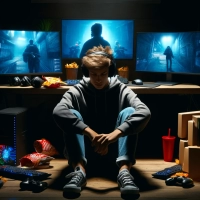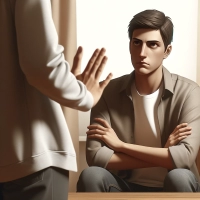Let's Talk About Gaming Addiction: What's the Big Deal?

Ever found yourself glued to the screen, joystick in hand, telling yourself just one more game at 2 AM? You're not alone. But when does 'just one more game' start to mean something more serious, like gaming addiction? Let's break it down and see why sometimes, the virtual win isn't worth the real-life loss.
Day-to-Day Interference Imagine this: You’ve got a big test tomorrow, or a major presentation at work, but instead of prepping, you’re wrapped up in an epic boss battle that just can’t wait. When gaming starts eating into your essential activities—like studying, working, or even just hanging out with your real-world friends—it’s no longer just a hobby; it's a hurdle.
- Sleep Who? Missing out on sleep to hit that next level can leave you like a zombie the next day. And over time? It's all bad news for your brain and body.
- Social Slide: When your console gets more love than your companions, those relationships start to fade. And man, rebuilding is way harder than any game challenge.
Long-Term Fallout Here’s the kicker: chronic gaming can lead to some serious stuff down the road. Think health issues like back pain from all those hours sitting, or vision problems from staring at the screen. Mentally, it can be even rougher, with risks of depression or anxiety when real life doesn’t measure up to the high-stakes world of gaming.
Why Do People Get Hooked?
Behind the Addiction Video games are designed to hook you. They draw you in with rewards, new levels, and in-game achievements that give you a dopamine hit—your brain's way of saying, "This feels good, let’s keep going!" Plus, there’s the social side. You meet players from around the world, join teams, and feel like you’re part of something.
Stories from the Trenches
- Case of the Midnight Gamer: Jake started playing because it was a way to chill after work. Soon, he was staying up late every night, telling himself he’d stop after one more level. Work started to suffer, and so did his social life.
- Social Butterfly Turned Lone Wolf: Emily got into gaming as a way to connect with friends during lockdowns. It was fun, until her friends moved on, but she couldn’t seem to log off and get back to 'normal' social activities.
These stories might sound familiar, or maybe they even hit close to home. But understanding why you get hooked can help you start figuring out how to unhook.
Okay, so let’s talk gaming addiction—what is it really? Imagine this: gaming starts out as a fun part of your day, but somewhere along the line, it begins to take over. It’s like when you start binge-watching a show, and suddenly, it’s 4 AM, and you’re questioning your life choices. Gaming addiction is kinda like that, but you might be hitting 'play' instead of 'next episode.'
"Signs and Symptoms"
- Losing track of time: Ever started playing at 7 PM and next thing you know, it’s midnight?
- Neglecting the basics: Skipping meals, sleep, or bailing on friends to game?
- Mood swings: Getting super annoyed or restless when you're not gaming?
- It’s all you think аbout: Planning your next session during school or work?
Breaking the Cycle
Real-Life Tips Breaking out of the gaming loop doesn’t mean you have to quit cold turkey. But just like balancing your diet, it’s about finding healthier habits.
- Set Time Limits: Use apps or alarms as a reminder to take breaks and eventually log off. Maybe start by cutting down gaming time gradually.
- Find New Hobbies: Get back into sports, pick up a guitar, or dive into books. New activities can be just as engaging as any video game.
- Social Reboot: Make plans with friends and family. Real-life interactions can be way more rewarding than any online match.
Professional Help If gaming is taking over and nothing else is working, it might be time to talk to someone who gets it. Therapists aren’t just for crisis moments; they’re great for finding strategies to tackle addictive habits and getting your life back on track.
Recognize the Signs: First up, you gotta admit there's a thing going on. Notice when gaming is more than just fun, like when you're skipping meals or ditching friends just to play.
Talk About It: Get real with someone you trust about your gaming. Sometimes just talking it out can be a huge relief and the first step to managing it.
Set Clear Limits: Put a cap on your gaming time. Maybe start with something like no gaming after 9 PM, or gaming for only an hour on weekdays.
Tech Tools to the Rescue: Use apps that track or limit your gaming time. They can be a big help in keeping you honest.
Find Your Kicks Elsewhere: Dive into other hobbies that you love or used to love before gaming took over—sports, music, art, you name it.
Physical Activity: Get moving! Exercise can boost your mood and break the gaming spell. Even a quick walk can shake up your routine.
Regular Breaks: During gaming sessions, make sure to take breaks. Stand up, stretch, grab some water—just step away from the screen for a bit.
Balance That Life: Make sure you’re balancing gaming with other life stuff—work, school, hanging out with folks. It's all about moderation.
Mind Check: Keep an eye on your mood. If gaming is the only thing that makes you happy, it might be time to reevaluate what’s going on.
Seek Help If Needed: No shame in reaching out to a professional like a therapist, especially if gaming is really messing with your life.
Reward Progress: Set milestones for reducing your gaming time and reward yourself when you hit them. Maybe treat yourself to something cool that’s not game-related.
Stay Connected: Don’t isolate. Keep up with friends and family. Social support is key when you’re trying to make a change.
Conclusion
Games are meant to be fun, not a full-time job. If your gaming habit is starting to turn into a bit of a monster, take back control. Remember, it’s perfectly okay to enjoy gaming as long as it’s part of a balanced life.
- Video response to the topic: Let's Talk About Gaming Addiction: What's the Big Deal?
While self-care strategies are valuable for managing symptoms related to psychological issues, they are not a substitute for professional treatment. It's important to recognize that self-care complements but does not replace the expert guidance and personalized therapy provided by qualified mental health professionals. Engaging in self-care is beneficial for general well-being and can be part of a broader treatment plan, but it's crucial to consult with a healthcare provider to ensure that you are receiving comprehensive care, especially for complex psychological conditions. This approach ensures that any underlying issues are properly addressed, potentially enhancing the effectiveness of self-care practices.


